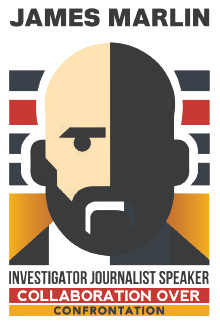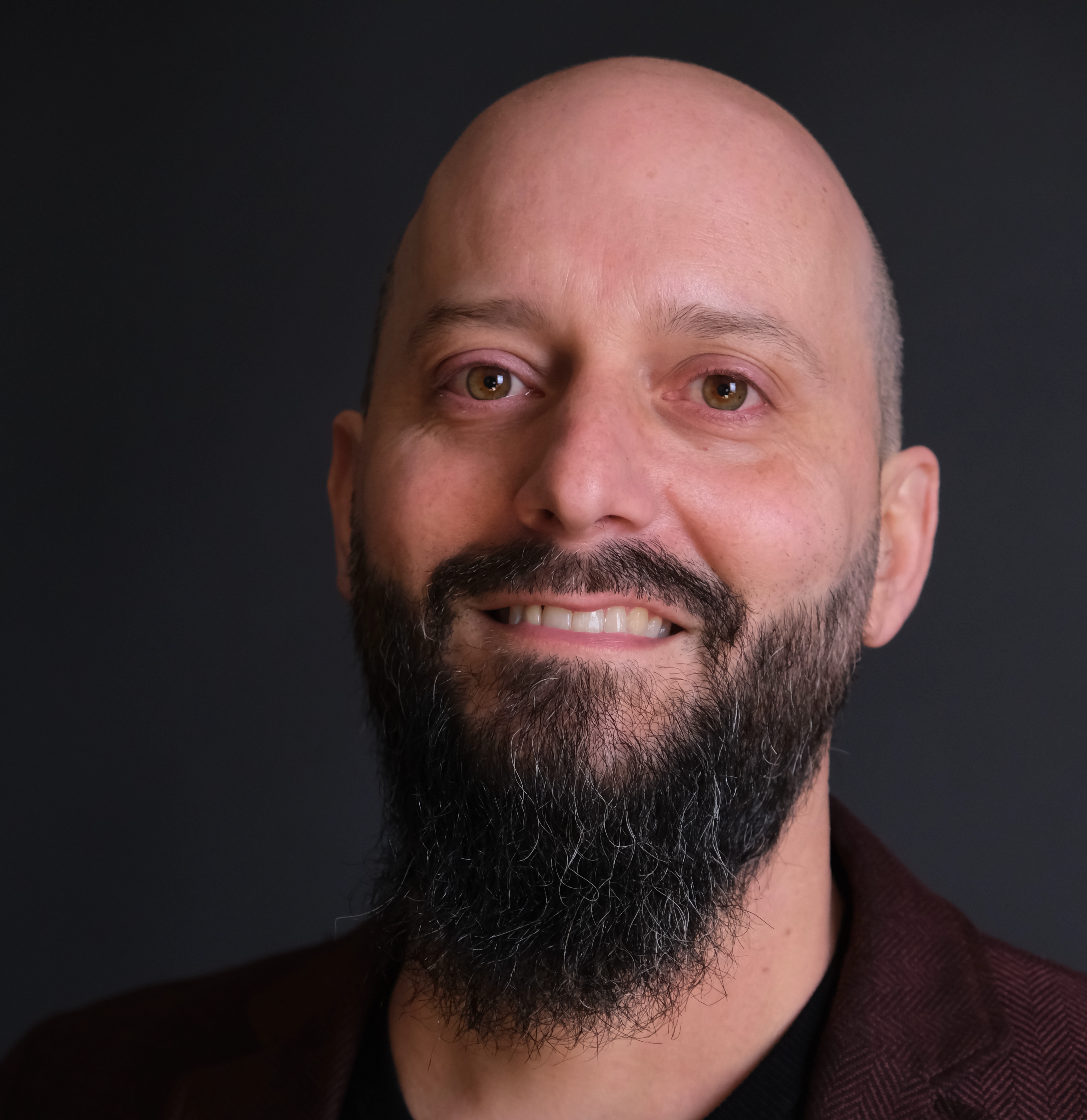James Marlin is a professional questioner, storyteller, dad, and husband with a passion for investigating. He works to distill complex findings into actionable and relatable information through his written articles and keynote talks. Having battled and overcome addiction, James firmly believes in the power of change. In the last five years, James has dedicated himself to investigating our beliefs, emotions, the conscious and subconscious minds, addiction, ADHD, mental illness, and the impact of technology on society. James is enrolled in a Modern Journalism course with NYU in partnership with Rolling Stone Magazine. Alongside his studies, he works as an investigator in the city of New York.
Introduce yourself!
My name is James Marlin, I am originally from the small town of Portland, Tennessee. I now live in Brooklyn, New York with my wife, Vanessa, our son, Lucas and our dog Renny. I am a husband, father, son and brother. I work as an investigator, journalist, and keynote speaker. I met my wife while I was working as a sous chef in a hotel in Old San Juan, Puerto Rico. She was the front desk manager and would take her breaks in the kitchen. And to this day is still the most beautiful woman I have seen.
Who inspires you to be the best that you can be?
It always boils down to wanting to make my wife and son’s lives easier and more comfortable. Along with mine too, of course. And while that does include things like making more money, it also involves being a better husband and father. I do not try to be perfect, but I want to continuously iterate myself.
Could I have listened more? Should I have spoken up more? Was I making my intentions clear? Am I understanding his or her intentions clearly? I don’t mean to give the impression that I obsess over these things. Rather, I try to be aware of when I am making things harder or easier and make the adjustments when I can.
I feel my role as a thought leader and my goal to inspire change in others is fortified and more authentic because I am a father. There is no greater responsibility than trying to guide and teach a human how to thrive in this world. How to be a force of good and a part of the solution rather than the problem. How to know when to listen to yourself versus others. And how to make meaningful decisions. Teaching my son how to learn from his mistakes and be a grateful person, inevitably makes me want to be the best I can be.
Also, my parents. I want to make them proud. Even though my father died a few years ago, it was one of my greatest personal achievements that he got to see me get sober and become the person he knew I could be. Before he died, he told me he was proud of me, and I try to earn that every day.
Furthermore, I got my work ethic from both my parents. My mother could work a 12-hour overnight shift as an emergency room nurse and, after seeing some pretty awful stuff, she could still come home and make us breakfast, get us ready for school and then be mom when we got home. I certainly didn’t realize it at the time, but now that I am a parent, I can see how that helped shape my priorities. No matter how tired I am or how much “work” I had to do that day, I still needed to be dad. I need to provide more than just food and shelter for my son.
What is your work inspired by?
Curiosity.
Why are things the way they are? Can they be better, and how? Why does this thing work and that one doesn’t? Where do my beliefs come from? How are they formed? When do my emotions take over my logical reasoning? How can I use them both to my advantage?
I am constantly asking questions. To myself and to others. Which comes in handy being an investigator. When I got sober, I had to find out everything I could about addiction and how it works. I had to find out how a person can convince themselves so thoroughly of a version of reality that is so far off. How could it be so off and yet so believable? So real? How did my ADHD play into all of this? Rather than focusing on the downside of ADHD, how can I use it to my advantage? Because it most certainly has advantages.
I have replaced my addiction to alcohol with an addiction to learning and curiosity. Sometimes my curiosity, along with my ADHD, feels like a pack of hunting dogs and I am learning how to unleash them on things I want to know more about. And these hunting dogs go after this thing from all kinds of different angles. And now that they are no longer hindered by alcohol, they can do their jobs and bring me the answers I am seeking.
There is a quote from Ernest Hemingway that really speaks to me. “There is nothing noble in being better than your fellow man. True nobility lies in being better than your former self.” I feel that on so many levels. I do not have any desire to be better than the next guy. I want to be the best me. So, I suppose these days I am on a path to personal nobility.
Tell us about your greatest career achievement so far.
Without equal it was when my 2nd restaurant failed. What I learned from that has been priceless. I learned hard work isn’t the solution to all of your business’s problems. You have to do more than put your head down and will it to be done. You have to be smarter than that. Pushing through your problems is not the same as solving them. And I learned when to say when. I learned how to “spot the anchor” as I call it. You can hang on to it and sink to the bottom with it, or you can let go of it and swim your way back to the surface.
Afterwards, I learned that you can come back from digging yourself into a deep hole. I learned about what sacrifices you should and shouldn’t make when it comes to your business and your family. The knowledge and experiences I got from that have been invaluable for creating my current success and achievements. It got me intimately familiar with the concept of “failing forward”. I began to understand, on a very real level, that as long as I asked the right questions, every time I fall, I can ensure that I land in a place that is further ahead. Not one single victory or achievement has ever taught me as much as that experience.
Tell us about a pivotal moment in your life that brought you to where you are today.
As I have mentioned I have had my battles with addiction. I am very lucky to have made it through to the other side. I have lost very close friends that did not make it out. I have seen firsthand the devastation that it can bring to people’s lives. Looking back, it is easy to see the warning signs, the red flags, the obvious moments of when I should have realized what I was doing to myself, my family, and my business. But again, as I mentioned before, when you are caught in addiction you can convince yourself so completely of a different version of reality. It is amazing for me to sit and think about some of the things that should have been the “pivotal moment”.
My wife stopped wearing her wedding ring, and I don’t know how long she wasn’t wearing it before I noticed. My parents had an intervention of sorts where my dad told me, “You can be a business owner, or you can be a drunk. You can be a husband, or you can be a drunk. You can be a father, or you can be a drunk. And You can be my son, or you can be a drunk.” Even though that didn’t make me stop at that time, I did start to understand the gravity of the situation. I realized that there were competing versions of myself that could not simultaneously exist.
Even when he was saying that to me, I had to think, “He doesn’t get it. I graduated from being a mere drunk a long time ago.” There was a saying that I would tell myself, to kind of dismiss when others pointed out my problem. “You speak of my drinking but know nothing of my thirst.” It was kind of a smart-ass way to justify the drinks I had and the ones to come. It turned out that I knew nothing of my thirst. Not really anyway. I couldn’t see what a grip it had on me physically, mentally, and spiritually. It pervaded every aspect of my being.
But I can say, without a doubt, that pivotal moment was when I was driving down the interstate one night and I realized I had no control over it. It hit me like a kick in the chest. I knew that I wanted to stop, that I had to stop, but I was unable to. I started to break down and cry and had to pull over on the side of the road. I called my dad and said, “I need help. I can’t do this anymore. I don’t want to be this way anymore. I love you and, I’m sorry.”
Within a week I was in rehab.
Everyone, addict or not, has a rock bottom. And for an addict, that rock bottom can take on many forms, but it ultimately is the moment you realize you have no control over your use of that substance. For some it may be the first time they overdose. Others can overdose multiple times before rock bottom. Some people, friends of mine included, will die before they reach rock bottom. If a part of you still thinks you have this under control, then no matter how bad things have gotten, they will get worse.
It was both scary and a relief. Realizing I didn’t have control was terrifying, but it also meant I didn’t have to fix it on my own. I couldn’t fix it on my own.
And much like the failed restaurant, it is almost impossible to put into words the things my battle with addiction has taught me. These things have forged me. I wish I didn’t have to cause others so much pain to learn them though. For those lessons I am grateful, and I try to make sure that the cost of learning them is not in vain. And, it is important to realize that it so easily could have gone the other way.

